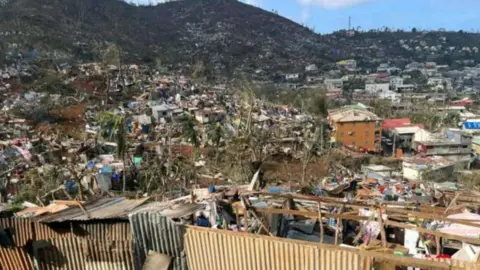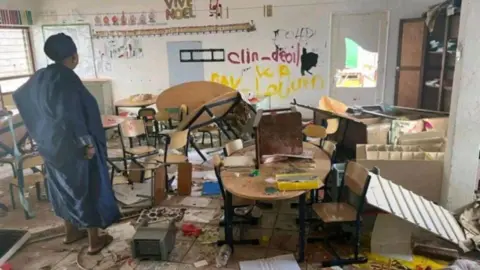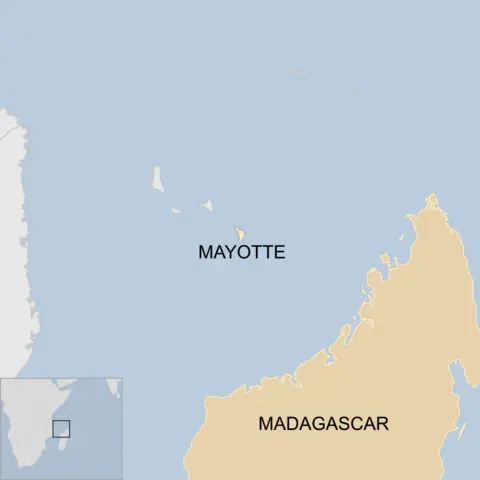The search for survivors in Mayotte, a French island territory in the Indian Ocean, continued on Sunday after it was hit by a powerful cyclone.
Rescue workers are still attempting to reach some communities and it is feared the eventual death toll could stretch into the thousands once the damage is fully assessed.
Entire settlements were flattened when Cyclone Chido brought wind speeds of more than 225km/h (140mph), with the poorest living in makeshift shelters particularly hard hit.
Some of Mayotte’s population of 320,000 have said they are struggling with severe shortages of food, water and shelter.
One resident of the capital city, Mamoudzou, waiting in line for supplies said: “We’ve had no water for three days now, so it’s starting to be a lot.
“We’re trying to get the bare minimum to live on, because we don’t know when the water will come back.”
Mohamed Ishmael, another Mamoudzou resident, told Reuters news agency the situation there was “a tragedy” and said: “You feel like you are in the aftermath of a nuclear war… I saw an entire neighbourhood disappear.”
 Getty Images
Getty ImagesAnother said they had used a nearby school for shelter, adding: “We can still take refuge with our neighbours, and we’re still sticking together and being cautious. We need everyone to hold hands.”
Mayotte’s impoverished communities, including undocumented migrants who have travelled to the French territory in an effort to claim asylum, are thought to have been particularly hard hit due to the vulnerable nature of their housing
Its population is heavily dependent on French financial aid and has long struggled with poverty, unemployment and political instability.
About 75% of the population lives below the national poverty line and unemployment hovers at around one in three.
French President Emmanuel Macron said his thoughts are with “our compatriots in Mayotte, who have gone through the most horrific few hours and who have, for some, lost everything, lost their lives”.
While some French aid and rescue workers have reached Mayotte, efforts to get to some communities are still under way.
 Getty Images
Getty ImagesFrancois-Xavier Bieuville, the island’s prefect, told local media the death toll could rise significantly once the damage is fully assessed. He warned it will “definitely be several hundred” and could reach the thousands.
French Interior Minister Bruno Retailleau, who is scheduled to visit the island, acknowledged the “exceptional severity” of the cyclone and assured that efforts to assist the population are being ramped up.
Cyclone Chido also brought strong winds and heavy rainfall to Mozambique, making landfall early Sunday about 25 miles (40.2km) south of the northern city of Pemba, according to weather services.
The cyclone caused structural damage and power outages in the northern coastal provinces of Nampula and Cabo Delgado on Saturday morning, authorities reported.
Guy Taylor, a spokesperson for aid agency Unicef in Mozambique, said “we were hit very hard in the early hours of this morning”.
“Many houses were destroyed or seriously damaged, and healthcare facilities and schools are out of action,” he added.
Mr Taylor said Unicef is concerned about “loss of access to critical services”, including medical treatment, clean water and sanitation, and also “the spread of diseases like cholera and malaria”.














Leave a Reply